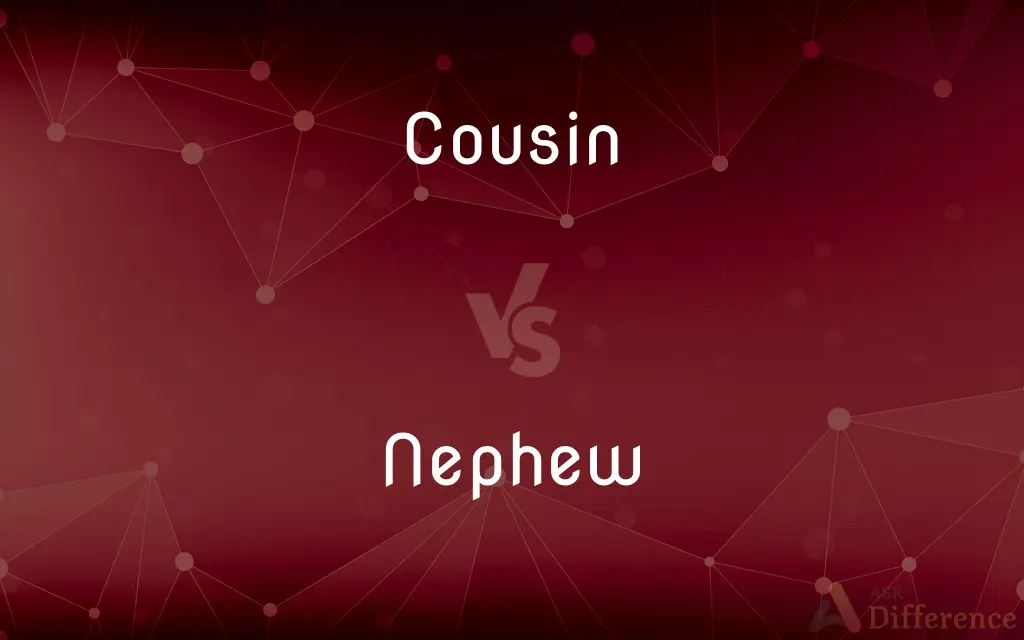Cousin vs. Nephew — What's the Difference?
Edited by Tayyaba Rehman — By Fiza Rafique — Updated on October 25, 2023
A cousin is a child of one's aunt or uncle, while a nephew is a son of one's brother or sister.

Difference Between Cousin and Nephew
Table of Contents
ADVERTISEMENT
Key Differences
A cousin is a term that denotes a family relationship indicating that two individuals share a common grandparent or, more broadly, an ancestor. This means that your cousin is the child of your parent's sibling. In contrast, a nephew holds a more direct familial tie. A nephew is specifically the son of your brother or sister. Thus, while both terms indicate familial connections, the nature of their relationship to you is different.
In discussing hierarchy, both cousin and nephew exist on the same generational level. However, while the cousin relationship is a lateral one, originating from your parents' siblings, the nephew relationship is a vertical one, coming directly from your own sibling. Therefore, if you imagine a family tree, cousins branch out from the same ancestral line, whereas your nephews come directly down from your line.
A cousin is a more flexible term in terms of relationship proximity. First cousins share a set of grandparents, second cousins share great-grandparents, and so on. Each additional degree denotes a further generation back to which the shared ancestor is found. Nephew, however, is a more fixed term, with the relationship always being the son of a person's brother or sister.
It is also worth noting that while the term nephew is gender-specific, indicating a male relationship, cousin is gender-neutral. This means a cousin can be male or female, whereas for a female equivalent of a nephew, one would use the term niece.
Comparison Chart
Relation to You
Child of your aunt or uncle
Son of your brother or sister
ADVERTISEMENT
Generational Level
Same as yours
Same as yours
Direction in Family Tree
Lateral (from your parents' siblings)
Vertical (from your siblings)
Degrees/Specificity
First, second cousins etc. based on shared ancestor depth
Fixed term, always the son of your sibling
Gender Specification
Gender-neutral
Male (female equivalent is niece)
Compare with Definitions
Cousin
A child of one's aunt or uncle.
My cousin Sarah is visiting from Florida this summer.
Nephew
A term sometimes used to indicate a younger male relative.
Little nephew, come here and give me a hug!
Cousin
A term used to describe someone or something similar in nature or character.
The cheetah is a cousin to the leopard in the big cat family.
Nephew
A son of one's brother or sister.
My nephew James just started school this year.
Cousin
A term used informally to address someone familiarly.
Hey, cousin! It's been too long since we caught up.
Nephew
A son of one's spouse's brother or sister.
After the wedding, Jake became my nephew by marriage.
Cousin
A relative descended from a common ancestor, like a grandparent, by two or more steps.
Though they were third cousins, they felt as close as siblings.
Nephew
A term of endearment towards younger individuals.
Hey nephew, it's been ages since I saw you last!
Cousin
Commonly, "cousin" refers to a "first cousin", a relative whose most recent common ancestor with the subject is a grandparent. More generally, in the lineal kinship system used in the English-speaking world, a cousin is a type of familial relationship in which two relatives are two or more familial generations away from their most recent common ancestor.
Nephew
In some cultures, an extended term for male children in the broader family.
In our village, every child is a nephew or niece to the elder.
Cousin
A child of one's aunt or uncle. Also called first cousin.
Nephew
A son of one's brother or sister or of the brother or sister of one's spouse.
Cousin
A relative descended from a common ancestor, such as a grandparent, by two or more steps in a diverging line.
Nephew
A son of one's sibling, brother-in-law, or sister-in-law; either a son of one's brother (fraternal nephew) or a son of one's sister (sororal nephew).
Cousin
A relative by blood or marriage; a kinsman or kinswoman.
Nephew
A son of one's cousin or cousin-in-law
Cousin
A member of a kindred group or country
Our Canadian cousins.
Nephew
(archaic) A son of one's child.
Cousin
Something similar in quality or character
"There's no mistaking soca for its distant Jamaican cousin, reggae" (Michael Saunders).
Nephew
A grandson or grandchild, or remoter lineal descendant.
But if any widow have children or nephews [Rev. Ver. grandchildren].
If naturalists say true that nephews are often liker to their grandfathers than to their fathers.
Cousin
Used as a form of address by a sovereign in addressing another sovereign or a high-ranking member of the nobility.
Nephew
A cousin.
Cousin
The child of a person's uncle or aunt; a first cousin.
I think my cousin is a good man.
Nephew
The son of a brother or a sister, or of a brother-in-law or sister-in-law.
Cousin
(archaic) A kinsman.
Nephew
A son of your brother or sister
Cousin
Any relation who is not a direct ancestor or descendant but part of one's extended family; one more distantly related than an uncle, aunt, granduncle, grandaunt, nephew, niece, grandnephew, grandniece, etc.
Cousin
(obsolete) A title formerly given by a king to a nobleman, particularly to those of the council. In English writs, etc., issued by the crown, it signifies any earl.
Cousin
(figurative) Something kindred or related to something else.
Cousin
A member of the British intelligence services (from an American perspective) or of the American intelligence services (from a British perspective).
Cousin
One collaterally related more remotely than a brother or sister; especially, the son or daughter of an uncle or aunt.
Thou art, great lord, my father's sister's son,A cousin-german to great Priam's seed.
Cousin
A title formerly given by a king to a nobleman, particularly to those of the council. In English writs, etc., issued by the crown, it signifies any earl.
My noble lords and cousins, all, good morrow.
Cousin
Allied; akin.
Cousin
The child of your aunt or uncle
Cousin
A person belonging to the same race or nation.
He referred to his fellow countrymen as his cousins.
Common Curiosities
Who is a nephew?
A nephew is the son of one's brother or sister.
Is there a term that goes beyond first and second cousins?
Yes, you can have third cousins, fourth cousins, etc., based on the depth of the shared ancestor.
How are first cousins different from second cousins?
First cousins share a set of grandparents, while second cousins share a set of great-grandparents.
Can the term cousin be used outside of familial contexts?
Yes, "cousin" can describe things similar in nature or character, or be an informal address to someone familiarly.
Is a nephew always directly related?
A nephew is directly related as the son of one's brother or sister, but he can also be related by marriage.
Can a cousin be both male and female?
Yes, the term cousin is gender-neutral and can refer to both male and female relatives.
What is the female equivalent of a nephew?
The female equivalent of a nephew is a niece.
Who is a cousin?
A cousin is the child of one's aunt or uncle.
How is a nephew related in terms of a family tree?
On a family tree, a nephew comes directly down from your line, being the son of your sibling.
How can one determine the degree of cousinship?
The degree of cousinship is determined by counting generations back to the shared ancestor.
Are cousins and nephews on the same generational level?
Yes, both cousins and nephews exist on the same generational level as you.
Can a nephew also be a cousin?
No, the terms are distinct. A nephew is specifically a sibling's son, while a cousin is an aunt or uncle's child.
How are cousins related in terms of a family tree?
On a family tree, cousins branch out from the same ancestral line, coming from your parents' siblings.
In colloquial terms, can "nephew" be used broadly?
Yes, in some cultures or contexts, "nephew" can be an endearing term for any younger male.
Can the term "cousin" be used in a non-literal sense?
Yes, "cousin" can describe someone or something similar in nature or character, like "cousin" in the animal kingdom.
Share Your Discovery

Previous Comparison
Must vs. Shall
Next Comparison
Coast vs. SeasideAuthor Spotlight
Written by
Fiza RafiqueFiza Rafique is a skilled content writer at AskDifference.com, where she meticulously refines and enhances written pieces. Drawing from her vast editorial expertise, Fiza ensures clarity, accuracy, and precision in every article. Passionate about language, she continually seeks to elevate the quality of content for readers worldwide.
Edited by
Tayyaba RehmanTayyaba Rehman is a distinguished writer, currently serving as a primary contributor to askdifference.com. As a researcher in semantics and etymology, Tayyaba's passion for the complexity of languages and their distinctions has found a perfect home on the platform. Tayyaba delves into the intricacies of language, distinguishing between commonly confused words and phrases, thereby providing clarity for readers worldwide.
















































